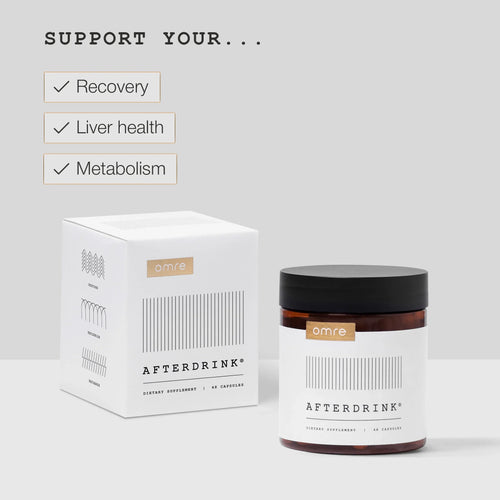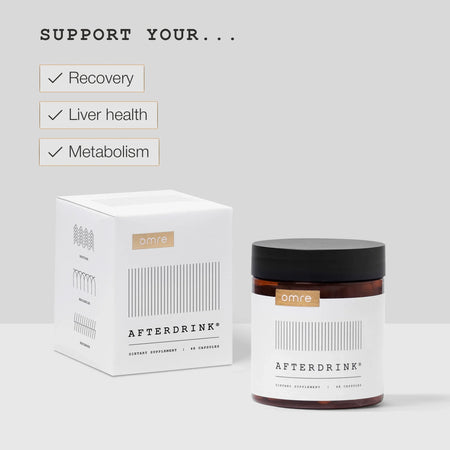Table of Contents
What herbs are good for hangovers? It’s actually a surprisingly common question and one that doesn’t exactly have a straightforward answer.
We all know that hangovers are caused by drinking too much alcohol. But everyone experiences hangovers differently. Some people don’t get hangovers in the first place!
For the majority of us, that’s not the case. And if you’ve landed on this article, chances are you’re looking for a herb that eases some of your discomforts.
Whether you’re looking for herbs to “prevent” a bad hangover, or herbs to help settle some of your symptoms, we’ve got you covered.
In this article, we’re going to take a closer look at whether there are any herbs that are good for hangovers.
Along the way, we’ll examine the available research studies to see if there are any science-backed herbal hangover remedies.
So, with the introductions out the way, let’s start taking a closer look at herbs for hangovers.
AFTERDRINK®
A supercharged antioxidant designed to support recovery, made from the very best, research-backed ingredients on the market.*
Causes of a hangover
Before we get into which herbs are potentially good for hangovers, we first need to go over the causes of a hangover:
1) Dehydration: Alcohol is a diuretic. It blocks a hormone called vasopressin from being released from your pituitary gland (in the brain) which controls fluid loss from your kidneys. By doing so, it causes your kidneys to flush out extra water which can lead to dehydration.
2) Disrupted sleep: Alcohol prevents your brain from reaching the REM stage which is important for waking up fully rested.
3) Inflammation: When alcohol is metabolized in your liver, harmful by-products such as acetaldehyde are formed. In simple terms, these react with your cells causing inflammation.
4) Congeners: Congeners are additional compounds found in alcohol that give it its distinctive taste and aroma. Unfortunately, congeners make hangovers worse and that’s why red wine and whiskey are notorious for giving bad hangovers.
In summary, the science of hangovers is complicated because there isn’t a single cause for your symptoms. Some factors will have more of an influence over others. Therefore, choosing the right herb for a hangover is dependent on your own personal circumstances.
What herbs are good for hangovers?
Before we start this section, it’s important for us to mention that the evidence for the herbs having beneficial properties is limited. Most of the research studies are small and preliminary. In addition, some of the studies haven’t been performed in humans. So that means, any benefit mentioned in this article should be taken as anecdotal evidence, rather than proven. We’ll do our best to highlight herbs that have better evidence than others.
With that said, we can now move on to the all-important question: What herbs are good for hangovers?
Herbs to ease hangover symptoms
So, you’ve had a few too many at happy hour last night. And now you’re feeling the full wrath of your hangover with all its usual trimmings.
Well, there are some herbs that could help:
1) Peppermint
The oil of this herb is commonly used to settle upset stomachs. Particularly in people with IBS-type symptoms which include bloating, flatulence, and abdominal cramps.(1)
So, if these are symptoms that are bothering you after a few too many drinks, it may be the best hangover herb for you.
2) Chamomile
The active ingredient in chamomile is thought to have soothing effects on anxious nerves. That’s why you’ll see it used in aromatherapy oils as well as bedtime teas.
There are quite a few research studies into chamomiles’ benefits and many have shown modest improvements. However, a lot more research needs to be done.(2)
Nevertheless, it’s a good herb to try for “hangxiety“.
3) Ginger
One of our favorite hangover herbs (or spices) is ginger. It’s effective for alleviating nausea and is even recommended first-line for things like morning sickness. Furthermore, unlike most herbal remedies, ginger has a good evidence base and is research-backed.(3)
Hangover nausea is arguably one of the worst symptoms you can have in the morning. And if it’s something that troubles you, trying ginger to settle your symptoms is a good option.
4) Turmeric
There’s a lot of interest in turmeric at the moment. Studies have repeatedly shown that its active ingredient, curcumin, has anti-inflammatory and antioxidant properties.
The problem is that it’s poorly absorbed from your gut. But liquid preparations that utilize micellar technology have shown superior absorption.
Nevertheless, it’s another hangover herb that could potentially ease inflammation when hungover.
Herbs to prevent a bad hangover
Now that we’ve gone through the herbs that could potentially help when you’ve already got a hangover, we can now move on to herbs for prevention.
We’ve mentioned it before and we’re going to do so again. The best way to prevent a hangover is to drink less. Below, we’ll cover some herbs that have been shown in some studies to help “reduce” hangover symptoms. But by no means will any of these herbs fully prevent hangovers.
1) Vine tea (Ampelopsis grossedentata)
Dihydromyricetin is the active ingredient in Vine tea (Ampelopsis grossedentata).
It’s a herb that’s received a lot of attention in recent years for potentially reducing hangover symptoms. There are a few small-scale studies that suggest there may be some benefit. But other studies have shown it makes no difference. So the jury is still out on whether this is a good hangover herb.
2) Prickly Pear
Prickly pear is the fruit of a cactus plant and is packed full of polyphenols which are antioxidants. A study in 2004 on 64 test subjects showed that prickly pear had a “moderate effect on reducing hangover symptoms”.(4)
It’s another hangover herb with promising results. However, more research needs to be done to see if these results are reproducible.
3) Korean Ginseng
Another smaller study in 25 men showed that Ginseng reduced hangover symptoms as well. The researchers think that Ginseng may work in a similar way to Dihydromyricetin.(5)
But again, further work needs to be done to see if this herb is good for a hangover.
4) Milk thistle
Milk thistle is one of the most popular herbs used for a hangover. Although there are no studies to date looking at whether it reduces hangover symptoms or not, lots of people use it for this purpose.
Studies have shown that milk thistle can reduce inflammation in the liver and settle upset stomachs. And that’s why you’ll find it in most “liver health” supplements.(6)
AFTERDRINK®
A supercharged antioxidant designed to support recovery, made from the very best, research-backed ingredients on the market.*
Herbs to avoid for hangovers
Now that we’ve covered herbs that you can use for hangovers, there are a couple of herbs you may want to avoid.
Kudzu
Kudzu is a traditional Chinese herb that’s used to make tea. You can also find supplements containing Kudzu as well. The problem with Kudzu mixed with alcohol is that it inhibits (blocks) the enzymes that metabolize acetaldehyde.(7)
At the beginning, we mentioned that acetaldehyde is a highly toxic by-product of alcohol metabolism. Therefore, it may not be an ideal choice.
On that note, follow the link to see what the best tea for a hangover is.
St John’s Wort
St John’s wort is a herbal supplement that’s used to treat mild anxiety and depression. It has a relatively potent effect on your liver enzymes and taking it in conjunction with alcohol is not recommended.(8)
Anything else to consider?
Before you try any herbs for a hangover, you should always read up on any potential side effects. Even natural things like herbs can cause problems, especially if you’re taking other medication or have any medical problems. So it’s always best to speak to your doctor before trying new herbs.
Hangovers are a sign from your body that you’ve been drinking over your limits. Trying to use herbs to prevent or reduce hangover symptoms is not the ideal approach.
Drinking less alcohol, eating before going out, and keeping well hydrated is all that is required to prevent waking up with a bad hangover.
Best herbs for hangovers – Final words
That brings us to the end of our look into herbs for hangovers.
Although not all of the items mentioned above are strictly “herbs”, we’ve still included anything that’s natural and may be available in your kitchen.
We’ve picked out some hangover herbs with potential hangover reducing properties.
If you’re interested in this topic, check out our article on the best vitamins for a hangover.





